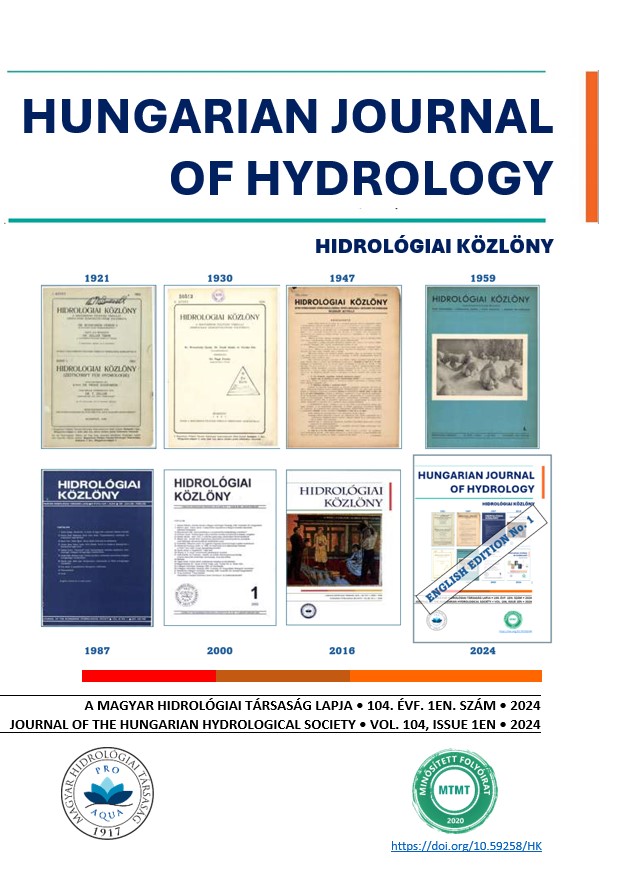System behaviour of water and environmental law
Abstract
Rules and procedures of mechanical things might be revealed by a piece by piece, linear analysis, while large unorganised masses can be approached by means of statistics. However, there is a vast middle layer of entities with complex structure and hardly calculable non-linear procedures that offer themselves for system science. System thinking makes possible that we understand wicked problems, perfect storms and other similar phenomena that otherwise resist the old, positivist, silo-thinking. In these cases, we learn that elements of a system form structures, develop procedures through which they together produce such results that could have been unimaginable solely by the elements alone.
Is it possible that with the help of system thinking we will be able to better grasp the essence of laws, moreover, we can design and implement laws with higher effectiveness? Is law a system? Or rather a complex tiered system of sub-systems, embedded into larger social-economic systems? In order to test these questions we analyse two intriguing sets of legal problems, to learn if we can describe and interpret them as systems that are – like systems generally – protecting their integrity with accommodation and resilience. The first example is the development of the segment of water laws that regulates drilling of small size wells for farms, where we see a 140 years process off gradual, more and more successful accommodation to the double social needs of protecting the interests of small farmers and sustainable development in respect to underground waters. This system resisted successfully an abrupt change that would have not fit to its goals. The second example is climate law as such – a relatively new development in the short history of modern environmental law, which can be hardly called a success story, because of the stiff resilience of the relevant branches of law. Indeed, resilience of law, as a complex, flexible and effective system does not always work according to our wishes.
References
Baume, S. (2009). On political theology: A controversy between Hans Kelsen and Carl Schmitt, History of Europe-an Ideas, Volume 35, Issue 3, 2009. pp. 369-381, ISSN 0191-6599. https://doi.org/10.1016/j.histeuroideas.2009.01.001
Bertalanffy, L.von (1968). General System Theory: Foundations, Development, applications; George Braziller, New York 1968.
Cribb, J. (2019). Food and Conflict: Premonitions: The Crimson Thread – Food Empires – Here Come the Long Ships – Food and the Rise of China – Food and India – Food and War – Fear of Famine. In Food or War (pp. 1-25). Cambridge: Cambridge University Press. https://doi.org/10.1017/9781108690126.001
De Sousa, D. (1920). Systems Thinking: How can it be used to enhance regulation?, Dart Legal Counsulting, Food for Thoughts section, available at: (https://www.dartlegal.com.au/food-for-thought/systems-thinking).
Faragó, L. (2017). Autopoietikus (társadalmi) terek koncepciója = The concept of autopoietic (social) space. Tér és Társadalom, 31. (1). pp. 7-29. ISSN 2062-9923. https://doi.org/10.17649/TET.31.1.2839
Freeman, R., Cherruault, J.-Y., Yearworth, M. (2014). Review of Literature on Systems Thinking and System Dy-namics for Policy Making; a report Prepared for Department for Environment, Food and Rural Affairs in 2014.
Fulop, S. (2021). Improving implementation and the evidence base for the ELD, final report to the European Commission, 2021, Brussels, pp. 1-246. (https://circabc.europa.eu/ui/group/3b48eff1-b955-423f-9086-0d85ad1c5879/library/ec101025-1121-4809-a1ac-e72a146fd20d/details?download=true).
Fülöp, S. (2022). A hazai klímavédelem és alkalmazkodás jogi keretei, Társadalmi Reflexió Intézet, Budapest. (https://socialreflection.org/wp-content/uploads/2022/12/F%C3%BCl%C3%B6p-S%C3%A1ndor-A-hazai-kl%C3%ADmav%C3%A9delem-%C3%A9s-alkalmazkod%C3%A1s-jogi-keretei.pdf).
Fülöp S., Szamek G. (2022). A stratégiai szintű állami döntések vizsgálata, azok kikényszerítésének lehetőségei, Társadalmi Reflexió Intézet, Budapest. (https://socialreflection.org/wp-content/uploads/2022/12/F%C3%BCl%C3%B6p-S%C3%A1ndor-%E2%80%93-Szamek-Gabriella-A-strat%C3%A9giai-szint%C5%B1-%C3%A1llami-d%C3%B6nt%C3%A9sek-vizsg%C3%A1lata-azok-kik%C3%A9nyszer%C3%ADt%C3%A9s%C3%A9nek-lehet%C5%91s%C3%A9gei.pdf).
Fülöp S. (2023). A klímaváltozáshoz történő alkalmazkodás és a klímavédelem joga (jogi szempontú értékelés nem csak jogászoknak), Környezeti Management és Jog Egyesület, Budapest, 2023. (https://justiceandenvironment.org/wp-content/uploads/2023/11/DACE_Hungary_legal-study-1.pdf)
Green, D. (2016). Systems Thinking Changes Everything. https://doi.org/10.1093/acprof:oso/9780198785392.001.0001
Hanschel, D., Aguilera Bravo, M.G., Dashpurev, B., Kedir Idris, A. (2022). Environmental Rights Between Consti-tutional Law and Local Context: Reflections on a Moving Target, German Law Journal (2022), 23, pp. 10121028. https://doi.org/10.1017/glj.2022.68
Heijden, J. van der (2020). Systems Thinking and Regulatory Governance: A Review of the International Academ-ic Literature; SSRN Electronic Journal, January 2020.
Kjaer, P.F. (2022). What is Transformative Law? European Law Open, 1, 4, 760-780, https://doi.org/10.1017/elo.2023.1
Klonick, K. (2023). Of Systems Thinking and Straw Men, Harvard Law Review Forum, Vol. 136:339. https://doi.org/10.2139/ssrn.4424585
Leroux-Martin, P., O'Connor, V. (2017). Systems Thinking for Peacebuilding and Rule of Law; Supporting Com-plex Reforms in Conflict-Affected Environments, Peaceworks Publication.
Meadows, D.H. (2008). edited by Diana Wright: Thinking in Systems, Earthscan, 2008.
Monat, J.P., Gannon, T.F. (2015). What is Systems Thinking? A Review of Selected Literature Plus Recommenda-tions, American Journal of Systems Science 2015, 4(1). pp. 11-26.
Pierson-Brown, T. (2020). (Systems) Thinking Like a Lawyer, 26 Clinical Law Review 515 (2020); also available at: (https://scholarship.law.pitt.edu/fac_articles/219).
Scholz-Karl, J. (2021). Behind the theoretical debate between Hans Kelsen and Carl Schmitt: the nineteenth centu-ry constitutionalism and German public law, UNIO - EU Law Journal. Vol. 7, No. 2, December 2021, pp 4-17. https://doi.org/10.21814/unio.7.2.3101
Töpfler, K, Meuleman, L., Bachmann, G., Jungcurt, S., Napolitano, J., Perez-Carmona, A., Schmidt, Falk (2011). Trans governance, the Quest for Governance of Sustainable Development, Institute for Advanced Sustainability Stud-ies, Potsdam.
Vinuales, J. (2023). Comparing Environmental Law Systems, British Institute of International and Comparative Law
United Nations Environment Programme’s Global Climate Litigation Report (2023). https://wedocs.unep.org/bitstream/handle/20.500.11822/43008/global_climate_litigation_report_2023.pdf?sequence=3
Copyright (c) 2024 Sándor Fülöp

This work is licensed under a Creative Commons Attribution-NonCommercial-ShareAlike 4.0 International License.




